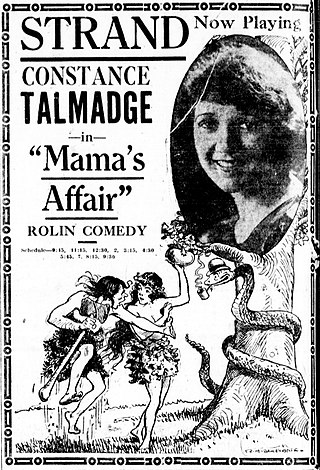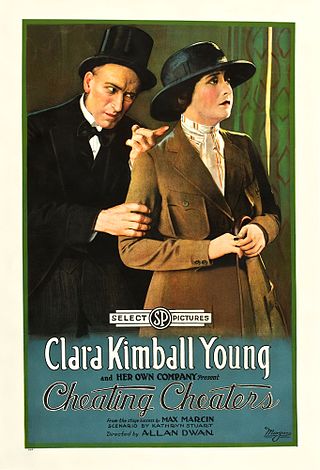Related Research Articles

Allan Dwan was a pioneering Canadian-born American motion picture director, producer, and screenwriter.

Mama's Affair is a 1921 American silent romantic comedy film directed by Victor Fleming and based on the play of the same title by Rachel Barton Butler. Cast members Effie Shannon, George Le Guere and Katharine Kaelred reprise their roles from the Broadway play.

15 Maiden Lane is a 1936 American crime film directed by Allan Dwan and starring Claire Trevor, Cesar Romero, and Lloyd Nolan. The Museum of Modern Art in New York City screened a restored print of the film in June 2013 as part of an Allan Dwan retrospective.
The Ways of Fate is a 1913 American silent short romance film produced by the American Film Manufacturing Company. The film's directorial and producer roles have been both attributed to Allan Dwan, but other sources point to Wallace Reid as director. The film's fictional plot is centered on Jim Conway, who grew up wanting to avenge his father's death and headed West to seek his father's killer. Lost in the mountains, he is saved by a young woman and the two fall in love. After a few weeks with her, Conway reveals the reason he came west and the young woman's father overhears it. The old man confesses to killing Conway's father, over a game of cards, and bares his chest. Conway refuses to take revenge, because love had diminished such feelings. The film was released on April 19, 1913 and it had a widespread national release. It is not known whether the film currently survives, but it is presumed lost.

The Restless Spirit is a 1913 American silent short drama film written and directed by Allan Dwan, featuring J. Warren Kerrigan, Lon Chaney, and Pauline Bush. The film is based on Thomas Gray's 1751 poem, Elegy Written in a Country Churchyard, and tells the story of a man who wishes to be a conqueror. A series of illusions follows which show him the futility of conquest when he cannot even conquer his own community.
The Lie is a 1914 American silent short western drama film directed by Allan Dwan and featuring Murdock MacQuarrie, Pauline Bush, and Lon Chaney. The film is now considered lost. A still exists from the film showing Chaney as "Young MacGregor".

The Honor of the Mounted is a 1914 American silent short drama film directed by Allan Dwan and featuring Murdock MacQuarrie, Pauline Bush, and Lon Chaney. The film is now considered lost.
Richelieu is a 1914 American silent historical drama film written and directed by Allan Dwan, based on the play Richelieu written by Edward Bulwer-Lytton. It featured Lon Chaney, Murdock MacQuarrie and Pauline Bush. This was Allan Dwan's last film for Universal, as he moved to New York afterward to work at the Famous Players Company and married his lead actress Pauline Bush in 1915.

Frozen Justice is a 1929 American pre-Code drama film directed by Allan Dwan. The picture starred Lenore Ulric in her first sound film and is based on the 1920 novel, Norden For Lov og Ret, by Ejnar Mikkelsen. A shorter, silent version of the film was also released. The film was set in Nome, Alaska during the Klondike Gold Rush in 1898 and 1899.

The Habit of Happiness is a 1916 American silent comedy film directed by Allan Dwan and filmed by cinematographer Victor Fleming. The film was written by Allan Dwan and Shannon Fife from a suggestion by D. W. Griffith and stars Douglas Fairbanks. A 16mm print of the film is preserved in a private collection.

David Harum is a 1915 American silent comedy-drama romance film written and directed by Allan Dwan, produced by Famous Players Film Company and distributed by Paramount Pictures. It is based on the 1898 novel of the same name by Edward Noyes Westcott and the 1900 Broadway play based on the novel, starring William H. Crane. Crane agreed to star in the film only if the film was written exactly as the play. David Harum is the only film of Dwan's for Famous Players that still survives. A print is preserved at the George Eastman House in Rochester, New York and the Cinémathèque Française in Paris.

What a Widow! was a 1930 American pre-Code romantic comedy film directed by Allan Dwan and produced by and starring Gloria Swanson. It was distributed through United Artists.

Cheating Cheaters is a 1919 silent film comedy directed by Allan Dwan and starring Jack Holt and Clara Kimball Young. Young's production company produced. It was released by Select Pictures Corporation.
The Big Noise is a lost 1928 American silent comedy film directed by Allan Dwan and starring Chester Conklin, Alice White and Bodil Rosing.
Associated Producers was an American film production and distribution company of the silent era.
Jordan Is a Hard Road is a 1915 American silent drama film directed by Allan Dwan and starring Dorothy Gish, Frank Campeau and Sarah Truax. The production was under the overall supervision of D. W. Griffith, and was the first film made by Dwan for Griffith's company Fine Arts. The evangelist Billy Sunday acted as a consultant. Composer J. A. Raynes composed theatre organ music to accompany this film. The film is set in Canada, with location shooting taking place for two weeks around Big Bear Lake in the San Bernardino Mountains. No prints are known to exist, and is therefore believed to be a lost film.

The Sin of Martha Queed is a 1921 American silent drama film directed by Allan Dwan and starring Mary Thurman, Joseph J. Dowling and Eugenie Besserer.

The Forbidden Thing is a 1920 American silent drama film directed by Allan Dwan and starring James Kirkwood, Helen Jerome Eddy and Marcia Manon.

A Broken Doll is a 1921 American silent drama film directed by Allan Dwan and starring Monte Blue, Mary Thurman and Mary Jane Irving.
The Haunted House is a 1917 American silent mystery film directed by Albert Parker and starring Winifred Allen, Richard Rosson and Albert Day.
References
- ↑ Lombardi p.48